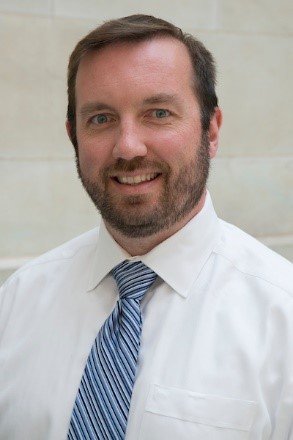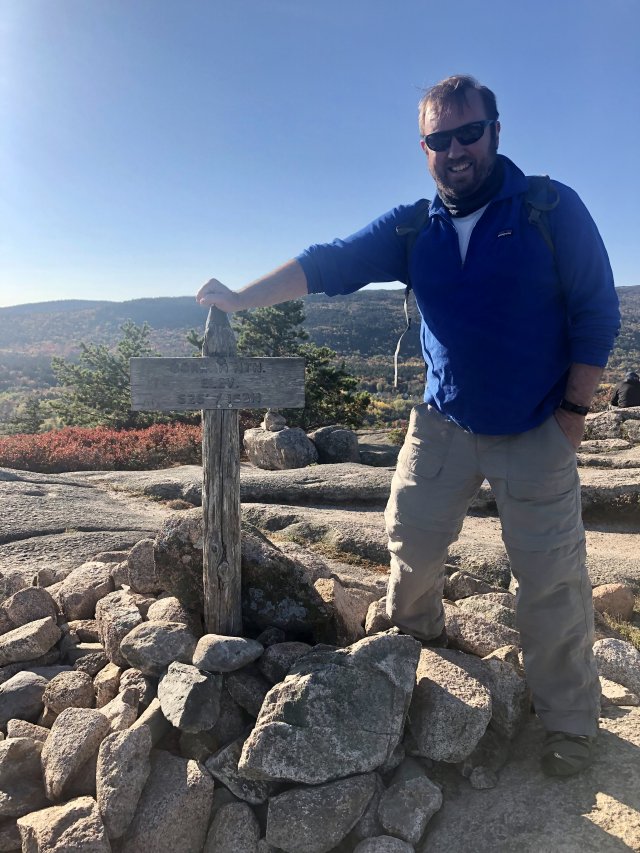Meet EPA Biologist and Science Review Officer Chris Rea, Ph.D., M.P.H.

EPA biologist and science review officer Chris Rea works as part of the Peer Review Team organizing, managing, and coordinating scientific peer reviews of extramural research grant proposals for the Office of Research and Development. His work connects with a broad array of environmental health-related scientific research topic areas, including air and water quality, climate change, and environmental justice. He’s currently preparing materials and gathering experts from numerous disciplines to support the peer review of the 19th Annual P3 Awards: A National Student Design Competition Focusing on People, Prosperity, and the Planet where he’s focusing on the air quality topic area.
When did you first know you wanted to be a scientist and work to protect the environment?
I loved my science classes when I was growing up, especially Earth/Environmental Sciences and Biology. When I was 13 years old, I took a two-week trip to the Sierra Nevada mountains in California. This trip planted a deep-seated passion for understanding the importance of nature and the environment. However, it wasn’t until years later, when I was fully immersed in a series of medical/graduate school prerequisite courses and reflecting on my long-term career goals, that I realized I wanted to combine my longstanding interests in health and the environment and pursue a career as an Environmental Health Scientist so that I could work to protect both human health and the environment.
What do you like most about your work at EPA?
I love supporting the mission of the EPA, as well as learning about cutting edge, novel scientific ideas that support our mission and research needs. It’s also great to work with dedicated people who share a commitment to public service, especially those with similar environmental health science interests.
How does your work matter?
The peer review team gets a broad view of the wide-ranging scientific topics requiring review. This review ensures that the extramural research that EPA supports is technically and scientifically sound, rigorous, and matches our priorities, justifying the work that the Agency supports. Additionally, we provide this assessment of research proposals in a fair, confidential, and equitable manner.

What is your education/science background?
I have my B.A. in sociology from Vanderbilt University and my master and doctorate degrees in public health from the Ohio State University, where my focus was on environmental health sciences. My doctoral research utilized a One Health framework and focused on wetland ecosystem services, avian associated pathogens, and recreational water quality in western Lake Erie. Prior to joining EPA, I was a Program Officer with the National Academies of Sciences, Engineering, and Medicine where I provided guidance and leadership for the Emerging Sciences for Environmental Health Decisions program. While there, I also worked with the Gulf Research Program to develop a Gulf of Mexico-wide community health and resilience program.
Before joining the Academies, I was an EPA post-doctoral fellow. During this time, I conducted benchwork for the Office of Pesticide Program's Microbiological Laboratory Branch where I investigated options for expediting antimicrobial efficacy testing. I then moved to the Office of Land and Emergency Management where I worked on science-policy issues as a member of the Policy Analysis and Regulatory Management Science Team. I also served on the U.S. Global Change Research Program’s Climate Change and Human Health Workgroup and throughout my education and scientific career I have worked on numerous climate change and health projects and initiatives.
If you weren’t in your current career, what would you be doing?
I nearly went to medical school, and in fact was on the track to do so before veering off that path to pursue my doctoral degree. So, I think I would likely be working in infectious disease or emergency medicine.
You are stranded on a desert island; how do you use science to survive?
Fortunately, science provides us with things like satellite phones and solar chargers. I’m going to presume that I’m stranded with those, in which case science will promptly get me “unstranded.”
What do you think is our biggest scientific challenge in the next 20/50/100 years?
In the short term, it will be to combat scientific misinformation while making real meaningful headway on urgent and pressing issues like climate change, a just energy transition, and moving towards a globally sustainable society. Over time, optimistically hoping we can move in that direction, we’ll need to fully integrate that sustainability into global economies and cultures and figure out how our planet’s growing population can live harmoniously as we become more and more interconnected.
What advice would you give a student interested in a career in science?
Do it. Don’t give up and don’t be intimidated. I’ve often heard people disparage their scientific skills and abilities, but I’m convinced that if a subject area is of real interest and passion, a dedicated person will eventually get there and be able to do it. For some people, the understanding may come quickly, for others it may take a bit longer and require more work, but we all can engage with work that is meaningful and matters to each of us.
Editor's Note: The opinions expressed herein are those of the researcher alone. EPA does not endorse the opinions or positions expressed.
